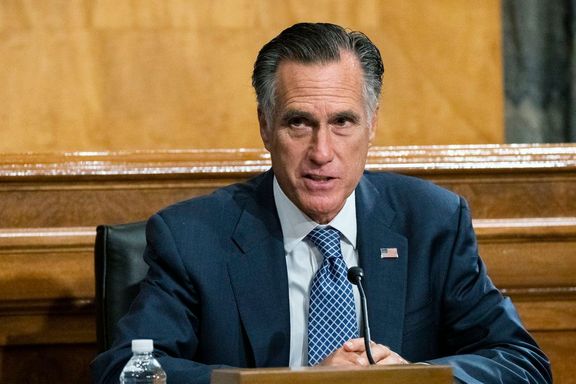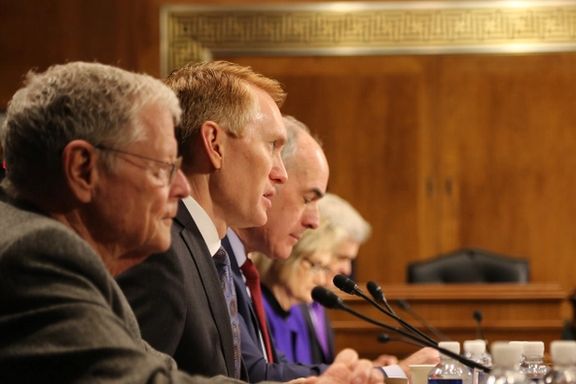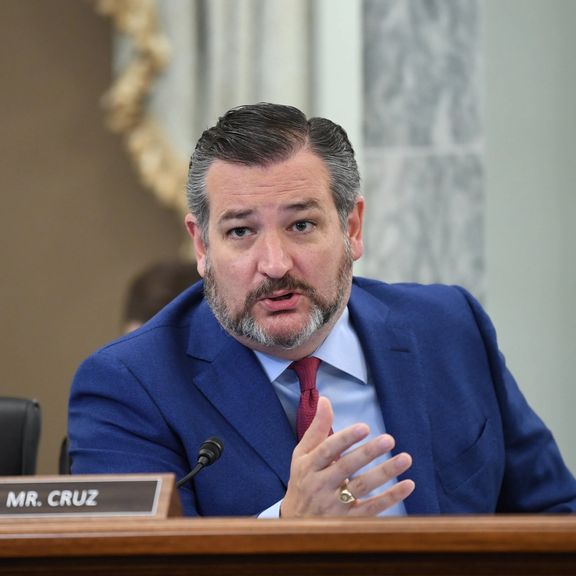US Committed To Stopping Iran’s ‘Insanity' Of Nuclear Weapons’- Senator

Republican senator Mitt Romney tells Iran International that the United States is committed to continue pressuring Iran to stop its malign activities across the Middle East.

Republican senator Mitt Romney tells Iran International that the United States is committed to continue pressuring Iran to stop its malign activities across the Middle East.
Romney added that "there is a commitment on the part of our nation to continue to pressure Iran to move away from the insanity of developing nuclear weapons and pursuing a terror agenda in the Middle East and throughout the world”.
He made the remarks in reference to two motions that were passed in the Senate on Wednesday. First, was proposed by Senator Ted Cruz that called for maintaining terrorism-related sanctions on Iran’s Central Bank to limit Tehran’s cooperation for China, while the other – led by Senator James Lankford instructed Senate conferees to make sure that a House bill would include language that the Biden administration caqnnot remove the terror designation of Iran’s Revolutionary Guard (IRGC).
Kentucky Senator Rand Paul, who voted against the motion about the IRGC, told Iran International’s correspondent Arash Alaei that “the problem with dictating all of the things that could be negotiated, in advance, prevents or makes it less likely to have any diplomatic agreement”.
“I voted against precluding certain items that might be negotiated because I think if you preclude those in advance... there would be no negotiations with Iran or never any agreement”, Paul said.
He added that “it is a mistake to legislate away things that could be negotiated”.

A new article has shed light on some disagreements within the US State Department regarding the Iran policy and the US negotiating team in Vienna.
The Al-Arabia article published on Thursday cited US diplomats and sources close to several former and current officials that there is a growing frustration within the State Department due to the centralized decision-making in the hands of only a few officials.
At least three members of the Iran negotiating team, which Special Envoy Robert Malley leads, have left in recent months, namely Richard Nephew, Ariane Tabatabai, and Dan Shapiro.
Nephew, who is known as the architect of Washington’s sanctions against Iran, left his position as the deputy to Malley on December 6 but in January he announced that his decision was “due to a sincere difference of opinion concerning policy.”
According to Al-Arabia sources, Tabatabai decided to leave the team because Malley allowed Russia’s ambassador in Vienna to take the lead on the talks, and Shapiro, a former US ambassador to Israel, also left his role as a senior advisor to Malley after about seven months. The unnamed sources said there was dissatisfaction among the negotiating team over Malley’s unwillingness to listen to opposing points of view.
Nephew told Al Arabiya that he will not comment about the Vienna talks “out of respect for the fact that the negotiations are ongoing and any public comments that I might make could unfairly prejudice those talks or affect the US position.”

The United States Senate Wednesday sent a strong message to the Biden administration opposing its current negotiating posture on the Iran nuclear deal.
The Senate passed a non-binding measure as an instruction to Senate representatives who will work with the House on a larger bill. It secured the votes of 16 Democrats for a total of 62 senators in favor.
Important Democrats such as Senate Majority Leader Chuck Schumer (D-NY) and Sens. Richard Blumenthal (D-CT), Cory Booker (D-NJ), Ben Cardin (D-MD), Chris Coons (D-DE), among others voted for the measure.
The measure introduced by Sen. James Lankford (R-OK) opposes entering into an agreement with Iran that only addresses its nuclear program, leaving out the issue of ballistic missiles and regional role, and demands that US sanctions on the Revolutionary Guard (IRGC) not be removed.
The House of Representative and the Senate are set to push forward with HR 4521, a long-stalled bill authorizing hundreds of billions of dollars to boost the country's ability to compete with Chinese technology, with Senate votes on motions addressing issues including energy policy and Iran sanctions.
This requires reconcilitation between the House resolution and Senate demands to reach at a final bill. Wednesday’s Senate votes on sevaral measures are instructions to its conferees when they meet to reconcile with the House.
The Lankford measure that was passed with a strong majority was one of these instructions and told the Senate conferees to insist on "provisions addressing the full range of Iran’s destablizing activities, including development of the means of delivery for [nuclear] weapons…support for terrorism, and evasion of sanctions…in the trade of petroleum products with the People’s Republic of China."
It also instructed that sanctions on the Islamic Revolution Guard Corps not be lifted and not to revoke its designation as a Foreign Terrorist Organization.
Earlier on Wednesday, the Senate voted 86-12 - with strong bipartisan support - for a similar "motion to instruct", sponsored by Republican Senator Ted Cruz, seeking a report on terrorism-related sanctions on Iran and saying such sanctions are necessary to limit cooperation between China and Iran.
If they become law, the Lankford and Cruz provisions could complicate delicate negotiations on the Iran nuclear deal, although western officials have largely lost hope that the pact can be resurrected, four years after former Republican President Donald Trump abandoned it in 2018.

The US Congress edged closer on Wednesday toward completing a long-stalled bill that among other issues would request a government report on Iran‘s role in terorism.
Although the motions are not binding, they convey a sense of what senators would like to see in the final bill and what could keep it from getting enough votes to become law.
In one of an expected 28 votes, the Senate voted 86-12 - with strong bipartisan support - for a "motion to instruct", sponsored by Republican Senator Ted Cruz, seeking a report on terrorism-related sanctions on Iran and saying such sanctions are necessary to limit cooperation between China and Iran.
If it became law, the provision could complicate delicate negotiations on the international Iran nuclear deal, although western officials have largely lost hope that the pact can be resurrected, four years after former Republican President Donald Trump abandoned it in 2018.
Negotiations, which started in Vienna in April 2021 to revive the Obama-era nuclear deal, JCPOA, have been on a protracted pause since March 11, as the Islamic Republic demanded removing its Revolutionary Guard (IRGC) from the US list of terrorist organizations.
Sen. Cruz before the vote called on lawmakers to vote "Yes" if they want terrorism sanctions on Iran’s Revolutionary Guard to remain, or "No" if they want to lift those sanctions. He also accused the Biden administration of refusing to enforce oil export sanctions on Iran, allowing it to sell more than a million barrels of crude a day.
Iran International has also obtained text of a Motion to Instruct Senate Conferees by Cruz that calls for identifying "major areas of diplomatic, energy, infrastructure, banking, economic, military and space cooperation…between Iran and China, regarding US policy to limit such cooperation…through terror-rekated sanctions imposed on Central Bank of Iran and the IRGC, as such sanctions are necessary to limit such cooperation.“
Media reports have indicated that the US was contemplating to remove the IRGC from its Foreign Terrorist Organizations list and only keep its foreign operations arm, the Qods (Quds) Force under sanctions. Iran has rejected a partial removal of sanctions and insists on all designations to be removed.
Opposition to Biden Administration's efforts to revive the 2015 nuclear agreement has grown in recent weeks, with an overwhelming majority of Republicans and many Democrats opposing a return to deal and making concessions to Tehran.

Texas Republican senator Ted Cruz says the Biden administration reportedly has a secret assessment that shows the benefits from the new Iran deal are now zero.
He wrote in a tweet on Tuesday that the benefits of restoring the 2015 nuclear deal with Iran is zero because the Biden administration has allowed the Islamic Republic to make so much progress in its nuclear program.
He added the administration is “so ideologically committed to doing their deal they're refusing to make the assessment public”.
The CEO of the Foundation for Defense of Democracies (FDD) reacted to the revelation on Wednesday, saying, “Congress immediately needs to get to the bottom of this and release this assessment”.
Calling for major policy and personnel changes, Mark Dubowitz said, “The Biden administration’s Iran policy is a total failure”.
Cruz first talked about the assessment during a Senate Foreign Relations Committee hearing on Tuesday, but Deputy Secretary of State for Management and Resources Brian McKeon dodged questions about it, saying it is an assessment of the intelligence community and classified.
“Since President Biden is elected, Iran has made enormous, unprecedented progress on its nuclear program, including enriching uranium to 60 percent, deploying advanced centrifuges, and acquiring significant knowledge”, Cruz said.
He added that “the Biden administration has a secret assessment that says there is a point after which the nuclear progress would make the deal meaningless”, urging the secretary of state to reveal that point to the public.
The negotiations, which started in Vienna in April 2021, have been on a protracted pause since March 11, as the Islamic Republic demanded removing Iran’s Revolutionary Guard (IRGC) from the US list of terrorist organizations.

An Iranian lawmaker says if the talks to restore the 2015 nuclear deal do not continue in line with the country’s interests, they will not be necessary.
Member of parliament's National Security and Foreign Policy Committee Zohreh Elahian said on Wednesday that it is not the policy of the current administration to negotiate for the sake of negotiating.
She reiterated that “all sanctions must be lifted, and we must certainly obtain a credible guarantee from the United States so that we do not face another withdrawal from the agreement and the return of sanctions”.
She added that the Islamic Republic has not gotten any credible guarantee so far, and US President Joe Biden’s statement will not meet Iran’s criterion for concluding an agreement. Former US president Donald Trump unilaterally withdrew from the Obama-era Nuclear deal JCPOA and imposed sanctions on Iran.
Emphasizing that the parliament, the country's negotiating team and the Foreign Ministry are of the opinion that “an internal guarantee” must be obtained for the agreement, she explained that such a guarantee should be included in the agreement so if the other side reinstates sanctions or imposes new measures, Iran’s commitments to limit uranium enrichment will be cancelled.
Direct negotiations with the United States are not currently on Iran’s agenda, the MP said and added. “We are waiting for the decision by the American side, and if this process becomes attritional, a decision will be made whether or not to continue the negotiations”.